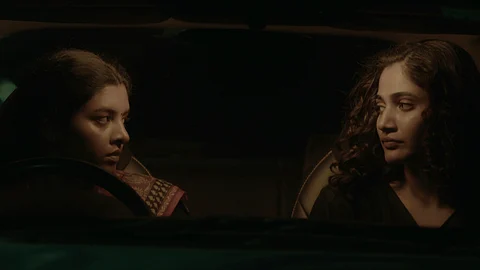

Gentlewoman (Tamil)
Joshua Sethuraman’s Gentlewoman might essentially be a story about two women: Poorni (Lijomol Jose), a homemaker who is forced to make marriage her entire identity, and Anna (Losliya Mariyanesan), an artist who has come undone in a manipulative relationship. But interestingly—and perhaps understandably, given that the film is anchored by a male filmmaker—the film has some of the most realistic depictions of men and their biases. There is the husband who hardly turns on the stove or his wife but wordlessly brews coffee for the single woman next door. A police official who is nice to the demure homemaker, but terrible to another for being in control of her desires. Gentlewoman provides us with interesting vignettes of men’s biases towards women. But does the film get into the women’s head as efficiently as it does with the men?
The film largely follows the life of Poorni and Aravind (Hari Krishnan), seemingly happy newlyweds settled in Chennai. While it isn’t hard to spot the cracks in this unequal relationship, the acts of domestic drudgery aren’t as obvious as they are in dramas such as the Malayalam film The Great Indian Kitchen (2021) or its Hindi remake Mrs (2025). Aravind is a husband who says “thank you,” but still expects his wife to deliver his dabba and car keys right to his hand. He is full of vague appreciation for a lunch that she slaved away in the kitchen for, but doesn’t once mention what the dish actually is. He wants his wife to be able to drive his tiny Honda but remains ignorant of the fact that she is used to driving heavier-duty vehicles in her village (this comes to a beautiful payoff in the interval when Poorni finally takes the steering wheel). Behind these tiny moments of slight, we see a silent rage simmering in Poorni’s eyes — an outpouring of a rage that reaches a boiling point when Aravind goes missing.
New characters are introduced, and bloodied secrets are spilled. Aravind’s second life comes into picture as Anna, a young artist, comes looking for him. The film then takes on a noir tone.
However, this is also where the film comes unraveled. The writing becomes rushed, and the subtle brushstrokes with which Poorni and Aravind were initially painted give way to heavy-handedness—this is most apparent in preachy monologues and underwritten scenes that feature a Poorni forced to rewrite her destiny.
The genre shift seems pretty efficient on paper, but the film lacks the time—it is barely 120 minutes long—and the depth in character development to go beyond scratching the surface. As a result, Poorni’s transformation from village ingénue to undettered wife fails to land with the intended impact. The same goes for Anna (played adequately by Losliya), who has a pragmatic point about one’s love for god and their life partner: “We don’t expect much from god, so why do we need to expect anything from the person we love?”
None of these women are one-dimensional, but the film’s rushed writing ensures that we learn a lot about their angst and desires through dialogue, and not so much through organic staging.
Composer Govind Vasantha and director of photography Sa Kathavarayan do much of the heavy lifting by owning the film’s stylistic choices. The way the colour red takes over the screen when Poorni’s catharsis begins, and how the violin haunts moments of tension are all deeply enjoyable.
There is a lovely little scene that comes a few minutes into the film: a bunch of women from different apartments in the building congregate in a senior woman’s kitchen to help her cook a feast. In this quiet moment of shared joy fostered by communal cooking, these ladies splay open their biases and, in the process, argue about what it is to be a woman. Gentlewoman wants to say a lot about women and societal attitudes towards her. But the film needed many more intricately written scenes like this one to effectively translate onto screen its terrific argument.
If there’s anything Sruthi loves more than watching films, it’s writing about it. Sruthi Ganapathy Raman’s words can also be read in Film Companion, Scroll.in, and The Times of India.
Disclaimer: This review was not paid for or commissioned by anyone associated with the film. Neither TNM nor any of its reviewers have any sort of business relationship with the film’s producers or any other members of its cast and crew.